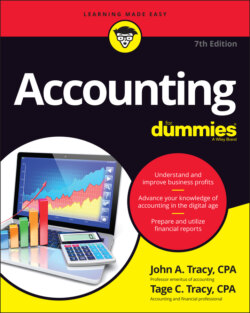Читать книгу Accounting For Dummies - John A. Tracy - Страница 31
Remembering management’s role
ОглавлениеWe explain more about the three primary financial statements (balance sheet, income statement, and statement of cash flows) in Chapter 2. They constitute the hard core of a financial report to those persons outside a business who need to stay informed about the business’s financial affairs. These individuals have invested capital in the business, or the business owes them money; therefore, they have a financial interest in how well the business is doing.
To keep informed about what’s going on and the financial position of the business, the managers of a business also use these three key financial statements. These statements are essential in helping managers control the performance of a business, identify problems as they come up, and plan the future course of a business. Managers also need other information that isn’t reported in the three basic financial statements. (In Chapter 13, we explain these additional reports.)
The three primary financial statements constitute a business’s financial center of gravity. The president and chief executive officer of a business (plus other top-level officers) are responsible for seeing that the financial statements are prepared according to applicable financial reporting standards and according to established accounting principles and methods.
If a business’s financial statements are later discovered to be seriously in error or deliberately misleading, the business and its top executives can be sued for damages suffered by lenders and investors who relied on the financial statements. For this reason, business managers must understand their responsibility for the financial statements and the accounting methods used to prepare the statements. In a court of law, managers can’t plead ignorance.
We’ve met more than one business manager who doesn’t have a clue about his or her financial statements. This situation is a little scary; a manager who doesn’t understand financial statements is like an airplane pilot who doesn’t understand the instrument readouts in the cockpit. Such a manager could run the business and “land the plane safely,” but knowing how to read the instrument panels along the way is much more prudent.
Business managers at all levels need to understand financial statements and the accounting methods used to prepare them. Also, lenders to a business, investors in a business, business lawyers, government regulators of business, entrepreneurs, anyone thinking of becoming an entrepreneur and starting a business, and, yes, even economists should know the basics of financial statement accounting. We’ve noticed that even experienced business journalists, who ought to know better, sometimes refer to the balance sheet when they’re talking about profit performance. The bottom line is found in the income statement, not the balance sheet!
